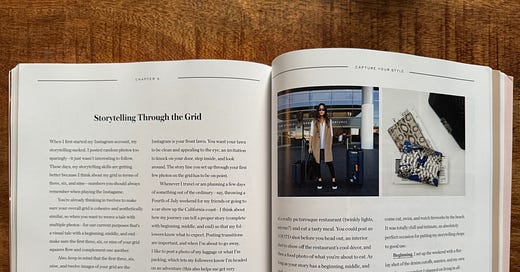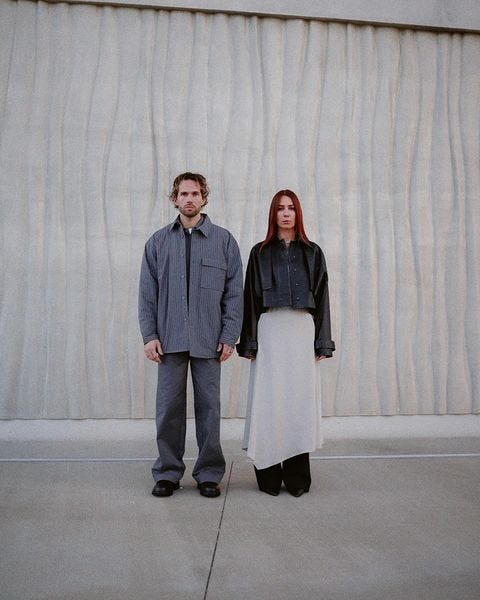Drop your handles
Usernames or handles on social networks are an important entry point to our digital identities. Far from being just marketing, the username might actually be quite political.
Tuesday night, new edition! Welcome to the new subscribers, and if you prefer to read this newsletter in French, here you go.
Usernames on social networks are an important element of our identities. While our avatars can evolve significantly, the username we use is usually meant to last. By appearing in notifications, it sticks in people's minds. It allows a creative person or a creator to be more easily remembered. It also enables everyone to cultivate their brand, even within friendly circles. The first fashion bloggers were called out by their usernames in the street, which is still the case today during Fashion Weeks.
In 2016, Aimee Song, better known by her alias “Song of Style,” published a book that remains a reference for anyone looking to better manage their image on social networks (especially Instagram), “Capture Your Style.” At the heart of this manual is the importance of the username as the entry point to a daily storytelling, hyper-fragmented into multiple contents. A recipe that has been adopted and reinterpreted by thousands of influencers who have become familiar in our feeds, like the duo behind jaimetoucheztoi, Alice Barbier & js Roques.
Cultural Codifications
It is difficult to create a complete atlas of how our cultures influence the way we choose our usernames.
In Japan, the creation of usernames is very creative. The name is often complemented by a series of numbers (which can indicate a birth date, an important moment in life), or playfully utilizes the technique of Goroawase (語呂合わせ, "phonetic matching"). The numbers can convey a lineage or a cultural code by playing on their pronunciations. The number 893, for example, refers to the Yakuza.
This way of writing usernames allows for the transmission of a universe, but sometimes also references that only a small group of friends can understand. Changing the series of numbers often indicates a new episode in the user’s life. A digital understatement that sends a subtle signal and promotes a form of insider understanding.
One Personality, Multiple Usernames
Creating usernames involves many contradictions: being easily recognized but also maintaining some privacy online. Some individuals do not hesitate to multiply the number of user accounts (and therefore usernames) on social networks to separate the groups they address.
Safy-Hallan Farah (aka
on Substack) already mentioned in 2017 the ambivalent relationship a personality has with the public space."Having an alt account when you’re highly visible seems like a high-res example of the need to be, or not be, a certain kind of person in public."
Safy-Hallan Farah
In a panoptical surveillance world, it’s no longer about disappearing from the networks but knowing what types of content can be distributed and to whom.
Since 2011, China has required users to register on social networks with their real names and biographical details. By 2023, this became the rule on Weibo, WeChat, Xiaohongshu, and Douyin. The username is no longer just a tool for storytelling or self-marketing, but a protection for one’s life. After all, during Second World War, French resistant Jean Moulin adopted the famous alias “Max.” Social networks have amplified this need for confidentiality while keeping in mind a significant technical issue: all links pointing to a previous username are broken if they are not updated with the person’s new username.
Personality vs. TikTok's Automated Preferences
Usernames, besides being an attempt to maintain control over our online activities, could also be an act of resistance against certain social networks.
In a way, TikTok has largely reduced the follower/following logic: the platform floods us with content supposedly tailored to our tastes, thanks to concatenation mechanics. The user – and even the individual – can largely disappear in favor of a machine without a real beginning or end, serving us decontextualized, uncredited content. The far-right has understood this well, letting the algorithms do their work: uncredited content gets pushed upon opening the app without us necessarily showing an explicit desire to receive it. As an analogy to the violence of TikTok, in the pre-internet world, we might have called it a poison pen letter or an anonymous phone call.
Against this disembodiment, a strong online identity can help create affection over time. An influencer with a well-known username can be searched online, create a diffuse link with their community, regardless of the platform. It’s as if the online presence of a person – once established – could transcend a single network, giving them significant existence.
Drop Your Alias
The Number of the Week: 63%*
According to a TikTok study from April 2024, 63% of American users want to see more ads with creators or influencers who represent their cultures. Multiculturalism (and being bilingual) is a topic still poorly addressed by brands in Europe.
Amazing Links
I extended my thoughts on totem animals for the New York Times, in the realm of luxury.
Nils Leonard reminds us in The Drum of the importance of creativity in the advertising professions.
Mind Health vs. mental health: an AXA report worth reading to understand corporate issues.
Have a great week! And feel free to share this newsletter, like, comment, send me your correspondence or recommendations, and keep sending me emails: these notifications are (always) a joy.







Super interesting read! I remember the time in Poland, around 5 years ago, where everyone chose very sophisticated / not usually used words for their instagram handles. I remember people being called „nostalgia” ( eng. longline for past) and other funky names!